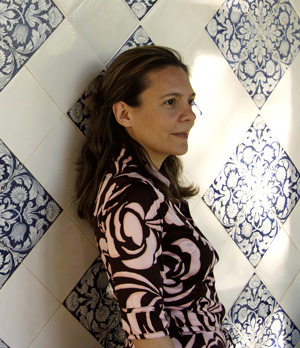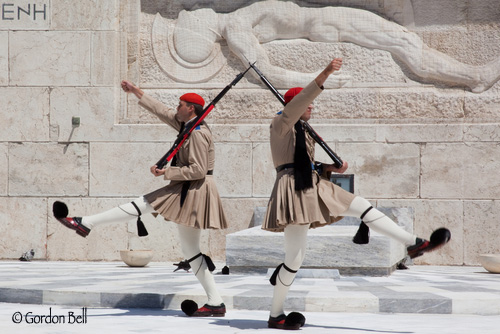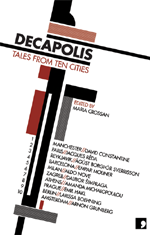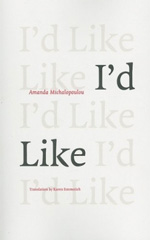

Born in Athens, Greece in 1966, Amanda Michalopoulou studied French Literature in Athens and worked for many years as a columnist for several Greek newspapers. An award-winning author, she has published six novels, two short story collections and many children's books. Her novels have been translated into multiple languages. I'd Like, her collection of interlinked stories, has been translated into English by Karen Emmerich and published by Dalkey Archive Press, which was awarded an international literature prize from the National Endowment for the Arts on behalf of the translation. The collection was also longlisted for the University of Rochester's Award for Best Translated Book. Publishers Weekly declared the collection a "a baker's dozen of tart, experimental, grown-up stories for literary tastes."
For those of us who read and loved I'd Like (reviewed in an earlier issue of Belletrista by Rachel Hayes) and wanted to read more of Amanda Michalopoulou's writing, we found a translated short story in Decapolis: Tales of Ten Cities, an anthology published by Comma Press. We are pleased to share this story with our readers here.
By the end of my studies I was acting like a true Brit. I ate baked beans for breakfast, called my roommate "my lovely," and every Saturday would go to Harrods's and buy some small, useless object. The olives I had bought in a fit of nostalgia rotted in their glass jar in the dorm's refrigerator, behind a label that read Authentic Greek Olives.
In the afternoons, as the sun set as slowly and dramatically as a Turner seascape, I gazed out the window of my low-ceilinged room onto the red brick of the neighbouring halls and the jagged chimneys in the background. I would smoke the day's last cigarette sitting by the window with its broken latches and the crusted bird droppings on the sill, and dream of living in London forever. I had no real reason to return to Athens. My friends had scattered to private universities all across Europe and the U.S. And my parents could live without me.
After I turned in my Masters thesis, I shut myself up in halls. I inhaled the damp of my room; I caressed the carpet, whose nap was pockmarked with cigarette burns, and I packed my suitcases, picking up my clothes one article at a time, carefully folding each. The sky had taken on its characteristic leaden color. I remembered the soldier from the fairy tale, the one with the leaden heart. Now I had grown up and become that soldier. A mercenary in the Legion of Foreign Students. A Master in Art History.
I returned home. My parents both worked—to put me through college, as they often reminded me—at an advertising agency. Thanks to the agency, they had got wrapped up in the upcoming Olympics. The house was full of hats and mugs bearing the Olympic logo. They came home at night so tired they would forget words. "Where'd you get the thingumybob," they'd say, or "Have you seen the whatsit?" My father had given up football. The only time he really cheered like a sports fan now was when they landed big jobs at the office. My mother even forgot my birthday.
I didn't know what to do with myself back at home, how to behave in my parents' house. It seemed gloomy to me, smaller and stuffier than my attic room in halls had been. I called up all my old friends, in alphabetical order. Half of them were still in school. The other half worked all day like my parents, and didn't have time for me anymore. I kept hoping someone I knew would come up to me in the street and say, "Hey! What are you doing here?" But the only people who paused at all were tourists looking for a bank, or for the entrance to the monorail that would take them to the top of Lycavittos.
 It was July when I first saw him. The sun, lifeless in the sky, bathed all of Athens in its light. I had walked as far as the National Gardens in search
of a patch of shade. There was a depressing little zoo there with some chickens and ducks and a few ostriches that seemed to be suffering from the heat.
They reminded me of myself: I too was tall and out of place in my surroundings. On my way home I passed by Parliament, dragging my feet, eyes on the ground.
So I saw his shoes first, with their funny pompoms. Then the white leggings of his summer uniform, the pleats of his skirt—the traditional foustanela,
blindingly white in the sun—his bayonet, his well-polished gun. His chest was wide and strong under his fermeli. His face was the most beautiful thing
I had ever seen: eyes as green as the olives I had left to rot, a long, thin nose, velvety lips, and a vein in his left temple that bulged as if it were
carved from stone.
It was July when I first saw him. The sun, lifeless in the sky, bathed all of Athens in its light. I had walked as far as the National Gardens in search
of a patch of shade. There was a depressing little zoo there with some chickens and ducks and a few ostriches that seemed to be suffering from the heat.
They reminded me of myself: I too was tall and out of place in my surroundings. On my way home I passed by Parliament, dragging my feet, eyes on the ground.
So I saw his shoes first, with their funny pompoms. Then the white leggings of his summer uniform, the pleats of his skirt—the traditional foustanela,
blindingly white in the sun—his bayonet, his well-polished gun. His chest was wide and strong under his fermeli. His face was the most beautiful thing
I had ever seen: eyes as green as the olives I had left to rot, a long, thin nose, velvety lips, and a vein in his left temple that bulged as if it were
carved from stone.
A few giggling tourists had gathered around him. They wore baggy shorts and their toes were coated with dust from all the construction taking place for the Olympics. I stood a little ways off, turned my head and watched him from an angle. His eyes met mine with that harsh, severe look they must learn during basic training. It was love at first sight for us both.
I passed whole days in front of Parliament, living on water and koulouria I bought from street vendors, like the backpack-laden tourists. Eventually I learned his shifts. Three times a day, for five hours at a time, he would stand straight-backed and motionless under his awning, and on the half-hour would dance his peculiar dance. Morning, noon, and night I watched those slapping steps with his funny shoes, the sleight of hand with his bayonet. The rest of the time he was forbidden from moving—but there was no way they could control the movements of his eyes. Beneath the merciless sun he watched me, never batting an eye.
I spoke to him in a low monotone, so the other soldiers wouldn't notice. Moving my mouth as little as possible, with little twitches and spasms, I told him about myself: "Do you want to know what I was studying? Art history, contemporary art. I know everything about the Neurotic Realists—I'm probably even more neurotic than them. Somehow I grew to hate Athens; I don't remember why. Maybe it was the pollution, before the advent of unleaded gas? All the bureaucracy? History class in school? The way people drive like maniacs? You know, the first thing you learn in London is to circulate invisibly through the crowds. You have to keep your face blank, even if they hold you down and pull out your nails one at a time. An "ouch" or two will suffice. But isn't that what you do, too? The evzone, guardian of history! I bet if I bit you you wouldn't scream." I kneeled down and sank my teeth into his thigh. His blood stained his white tights but my evzone didn't let out a peep.
Another time I said: "I had to get away from here, you know? Not for my studies, really—just to stop being myself, to try being someone else for a change. One way was to eat baked beans for breakfast. Another was to wash my clothes at the launderette in my neighbourhood, near Euston Station. Have you ever been to London? Do you know what it means to cry in the rain? And now I can't decide which I like better, England or Greece, the old wallpaper printed with coats of arms or our old family home in Kineta. But I know I like you. I like you a lot. And you're the Greekest thing there is, right?" When my evzone agreed, he would blink his eyes. When he disagreed he would look at me dispassionately like a tired man on the subway, or a psychoanalyst.
Then one evening in the second month of our acquaintance, everything changed.
The sky was as blue as in touristy postcards from the islands. It was August 15th—the Assumption of Mary, day of miracles—and a north wind was blowing. The branches of the trees on Vassilisis Sophia bent gently but firmly toward the pavement. The breeze also seemed to blow through my head, clearing my thoughts.
"I'm in love with you," I told my evzone. "But I'm not entirely sure what you are to me. When I want you, you become my God. When I'm angry you look like you're wearing a costume. Right now you look like a beautiful white object. Even the way you hold your bayonet… how can I describe it? You make me feel like it's all just an image. You're just a guard with a fancy fermeli and no feelings, that's all. You're even more hypocritical than the Brits: your foot falls asleep so you start dancing around like Karaghiozis; you want to follow me but stand there gaping. What kind of a man are you, anyway?"
"I'm not a man right now. I'm not a hundred percent man," my evzone whispered, blushing bright red for the first time. "I'm an idea."
"Bullshit."
"My foustanela has four hundred pleats. One for each year of the Ottoman Occupation."
"So you're still afraid of the Turks? Jesus, can't you live without enemies?"
"Right now you're my worst enemy," he said sadly.
"So leave your post. Comfort me. Make your famous idea more human."
"They'll discipline me."
"So what?" I said, with the stubbornness of a lover who requires constant proofs of love.
"I don't know if this will work. Between us, I mean."
"So what? Look around you. It's August and everyone's white as a sheet. They all work till they're ready to drop. I've been waiting around all this time. And what am I asking? Just for you to take me on a walk, or a ride."
"Find a bike."
"What?"
"A bike, I said. A motorcycle."
I stood in the middle of Vassilisis Sophias and pulled a girl off her motorbike. She fought back. I jerked her hair, bit her arm. I whistled to my evzone. He hopped onto the seat, and I hung on behind him. He turned the key in the ignition and we jumped forward. There were two police cars right on our tail, but my evzone, in a single, graceful movement, pulled out his bayonet and slashed their tires. He ran all the red lights and we ducked into the narrow sidestreets of Plaka, which were full of parked cars. It smelled of fried cod. When he turned off the engine we could hear the police sirens more clearly.
"You're crazy," I said, and hugged him.
"No, there's just something I want to show you." We pushed the motorbike into a little yard off a quiet lane in Anafiotika. We rolled it behind a staircase and moved a few oil drums potted with basil to hide it. With his bayonet he cut the rope off a wooden swing and shoved it under his vest. His tights had got dirty, and the pompom on one of his shoes was dangling like a bad tooth. As for the four hundred pleats, they had got completely squashed.
"So much for the Ottoman Empire," I chuckled.
My evzone shot me a stern glance, then nodded for me to follow him. When we reached the base of the Holy Rock he took the rope out of his vest, tied it to the tip of his bayonet, made a few knots, and we started our upward climb. He would stick the bayonet into crevices in the rock, we'd step on the knots to climb up, then search for jutting rocks to stand on while he pulled out the bayonet and wedged it in a little higher. By the time we reached the Parthenon the sun was gone from the sky. The columns were lit up at night like the teeth of some mythic beast. My evzone had ripped his dress on the climb, but he was more beautiful and angrier than ever.
I was angry, too. I was angry at everything: at the beauty and the breeze, at the cicadas' monotonous cries, at the girl on her motorbike for fighting back, at the police for intervening, at the fact that my evzone wasn't perfect.
"What did you want to show me?"
He took one of my cigarettes, lit it, and sat down cross-legged at the edge of the rock.
"See there, in the distance? That's where I live. See that lighted window? Not that building, with the pool on the terrace—what kind of family do you think we are? A little to the left, in that apartment building, the one with seven storeys. My parents must be eating. My brother is reading comic books. They fight over which channel to watch; they don't have money for a second TV."
"We have three. Want one of ours?"
"They wouldn't accept. My mother may go to the market with an empty wallet, but she never leaves the house without lipstick. As for my father… "
"What?"
"He's aged. He doesn't see well anymore. He holds his newspaper upside-down."
"Is your brother older or younger?"
"Younger. He's terrified they'll make him be an evzone, too. He's even taller than I am. He has three piercings in his ear and one in his nose."
"That's no good. Your energy seeps out those holes, you know."
"And that's exactly what drives me crazy. The holes, the lost energy, the comics."
"You're so old-fashioned… "
"No, I'm just what I am."
"What are you?"
He dropped his cigarette in the dirt and ground it out with his shoe.
"I brought you here so you could see for yourself what I am."
He opened his arms and I burrowed into his embrace. It was a large white embrace that smelled of green soap and mothballs. I tried to pull off his shoes and tights. I tugged at his foustanela. My evzone didn't resist. On the contrary, he encouraged me, taking my face in his hands and kissing it gently with his frozen lips. But the fabrics were very stiff, like marble, and seemed stuck to his skin. I grabbed hold of his bayonet, I fondled him through his tights—but all I felt was the cold wind of history.
"Why are you doing that?" I asked.
"I told you, I'm not a hundred percent man."
I was more in love, more desperate than ever. I didn't believe him; I had seen the red stain on his tights when I bit him. I knew he could be a man if he wanted to.
"You're driving me—" I said, panting.
"Come on, let's try again," he said. He undid the top button of his shirt and I tugged again at the fabric. The little patch of exposed skin was red and hot. Soon it was covered with blisters. It smelled burnt.
My evzone turned the other way. I couldn't tell if he was in pain or if he just wanted to be alone for a while. He lit another cigarette and looked at me sadly.
"You're right," I said. "There's nothing doing with us."
He set about straightening his pleats, almost obsessively. Four hundred pleats, one by one. It took him a long time. The cigarette dangled from his lips. Ash fell, until nothing was left but the filter. The sky grew dark and the cicadas told their stories. Bit by bit I forgot I had been angry with him.
"You're a strange girl," he said at last.
"You're strange, too. You behave like some folk philosopher."
"What you see is what you get."
"What kind of music do you listen to?"
"It depends on the situation."
"That's not an answer. What's your favourite food?"
"Okra."
"Ew. All that slime."
"Well, what's your favorite food, baked beans?"
"Whatever I feel like."
We sat side by side all night long, smoking. Every so often I would ask my evzone a question. He would answer fairly willingly, and then ask me the same question. What was my favorite book, my favorite male name—stupid stuff like that. I couldn't answer a single one. It was like I wasn't sure of anything anymore. All my preferences, all my tastes had been erased. I was exhausted from lack of sleep and my inability to decide made me cranky.
"You're the phoniest person in the world," I finally said to him. I was angry with him for pretending to accept life as it was. He was pretending to be wise and important. I felt like thinking up three hundred and ninety nine more insults. One for each of his pleats.
"You're malicious. Ill-bred. A bully."
My evzone stood up and walked to the edge of the rock.
"Conservative. Reactionary. Antagonistic."
The sun burst like a bloody wound in the sky.
"Arrogant. Cynical. Didactic."
My evzone spread his arms and flapped them back and forth like wings.
"Lazy. Egocentric. Jealous."
He dived with a tumble into the void. His foustanela spread like a fan around his body. The four hundred pleats rustled. He flew with strong, broad,
masculine strokes, like a champion swimmer. I looked at him with envy, with desire. At the same time I understood that I had let him down, too, and
there was no way he was coming back. And then I saw the pompom from his shoe glistening in the first rays of the morning sun. It had fallen on the
ground where we had been lying. I picked it up and clenched my fist around it. Then I grabbed my arm and bit it, until blood ran.

"The Four Hundred Pleats" appears in Decapolis: Tales of Ten Cities, Comma Press, paperback, 9781905583034

Dalkey Archive Press, paperback, 9781564784933
"The Four Hundred Pleats" was first published in Decapolis: Tales from Ten Cities by Comma Press, 2006.
Copyright © remains with the author and translator. By permission of Comma Press.
